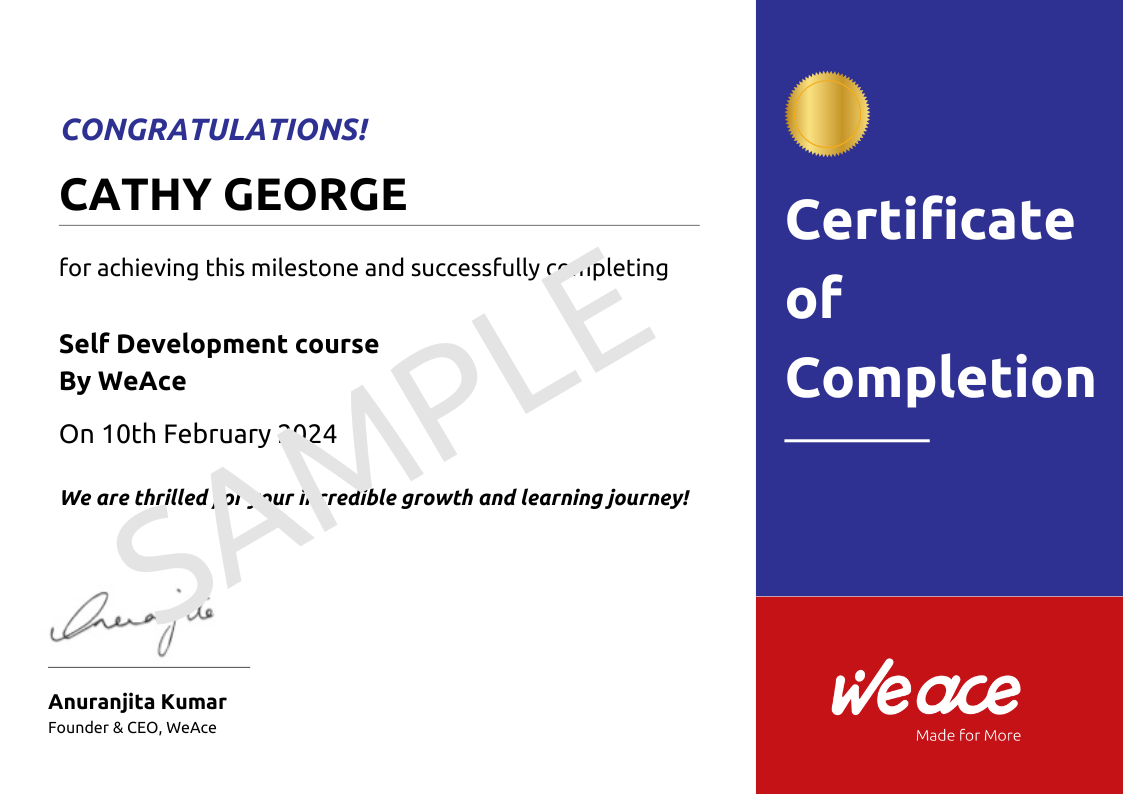Course Details
This is a half-day program for a batch size of 30 professionals.
A session on stakeholder management can provide invaluable skills and knowledge that are crucial for successful project and business outcomes. Here’s a detailed look at why you should consider attending such a session:
1. Understanding Stakeholder Management
- Definition and Importance: Learn what stakeholder management is and why it is critical to the success of projects and businesses.
- Stakeholder Identification: Understand how to identify all relevant stakeholders, including those who are directly and indirectly affected by a project or business activity.
2. Enhancing Communication Skills
- Effective Communication: Develop skills to communicate effectively with different stakeholders, ensuring clarity and understanding.
- Tailoring Messages: Learn how to tailor communication to meet the needs and expectations of various stakeholders.
3. Building Strong Relationships
- Trust and Engagement: Understand the importance of building trust and engaging stakeholders early and continuously throughout the project lifecycle.
- Managing Expectations: Learn techniques to manage stakeholder expectations and keep them aligned with project goals and deliverables.
4. Improving Conflict Resolution Skills
- Conflict Identification: Learn how to identify potential conflicts among stakeholders early on.
- Resolution Techniques: Gain skills in conflict resolution to address and mitigate conflicts effectively.
5. Strategic Planning and Analysis
- Stakeholder Analysis: Master tools and techniques for analyzing stakeholders, including power-interest grids and influence maps.
- Strategic Planning: Develop strategies for engaging different types of stakeholders based on their level of interest and influence.
6. Risk Management
- Identifying Risks: Learn to identify potential risks related to stakeholder engagement and management.
- Mitigation Strategies: Develop strategies to mitigate these risks and ensure stakeholder support and satisfaction.
7. Enhancing Project Success
- Alignment with Goals: Understand how effective stakeholder management aligns project outcomes with business goals.
- Increased Buy-In: Learn techniques to increase stakeholder buy-in, which can lead to more successful project implementation and outcomes.
8. Ethical Considerations
- Ethical Engagement: Understand the ethical considerations in stakeholder management and how to engage stakeholders ethically and responsibly.
- Transparency and Accountability: Learn the importance of transparency and accountability in building trust with stakeholders.
9. Gaining Practical Tools and Techniques
- Stakeholder Management Plans: Learn how to develop comprehensive stakeholder management plans.
- Communication Plans: Understand the components of effective communication plans tailored to different stakeholders.
10. Networking Opportunities
- Peer Learning: Share experiences and learn from peers facing similar challenges in stakeholder management.
- Professional Connections: Build a network of professionals skilled in stakeholder management for future collaborations and support.
Conclusion
Attending a session on stakeholder management can equip you with essential skills and knowledge to effectively engage, manage, and satisfy stakeholders. This can lead to improved project outcomes, enhanced relationships, and better alignment with business goals. Whether you are a project manager, business leader, or team member, mastering stakeholder management is crucial for achieving success in today's interconnected and complex business environment.
For more information on pricing and registration, contact [email protected]
Program Structure
Introduction and Orientation
- Welcome and Icebreaker Activities: Engage participants with activities to build rapport and create a comfortable learning environment.
- Program Overview: Introduction to the session’s goals, agenda, and expected outcomes.
- Setting Ground Rules: Establish guidelines for respectful communication and active participation.
2. Understanding Stakeholder Management
- Definition and Importance: Explain what stakeholder management is and why it is crucial for project and business success.
- Key Concepts: Introduce fundamental concepts related to stakeholders and stakeholder management.
3. Identifying Stakeholders
- Stakeholder Identification Techniques: Teach methods for identifying all relevant stakeholders, including primary and secondary stakeholders.
- Mapping Stakeholders: Use tools such as stakeholder maps to visualize the stakeholder landscape.
4. Stakeholder Analysis
- Power-Interest Grid: Introduce the power-interest grid to categorize stakeholders based on their level of influence and interest.
- Stakeholder Influence Map: Use influence maps to understand the relationships and influence dynamics among stakeholders.
- Case Studies and Exercises: Provide real-world examples and exercises to practice stakeholder analysis.
5. Developing Stakeholder Management Strategies
- Engagement Strategies: Teach strategies for engaging different types of stakeholders based on their analysis.
- Communication Plans: Develop communication plans tailored to the needs and expectations of various stakeholders.
- Building Relationships: Discuss techniques for building and maintaining strong relationships with stakeholders.
6. Effective Communication Skills
- Communication Techniques: Learn techniques for effective communication, including active listening and clear messaging.
- Tailoring Messages: Practice tailoring messages to meet the specific needs and preferences of different stakeholders.
- Role-Playing Exercises: Engage in role-playing activities to practice communication strategies in various scenarios.
7. Managing Stakeholder Expectations and Conflicts
- Expectation Management: Learn methods to manage and align stakeholder expectations with project goals.
- Conflict Resolution: Teach conflict resolution techniques to address and mitigate conflicts among stakeholders.
- Interactive Scenarios: Use interactive scenarios to practice managing stakeholder expectations and resolving conflicts.
8. Ethical and Responsible Stakeholder Management
- Ethical Considerations: Discuss the ethical considerations in stakeholder management, including transparency and accountability.
- Building Trust: Explore ways to build and maintain trust with stakeholders through ethical engagement practices.
9. Risk Management and Stakeholder Engagement
- Identifying Risks: Learn to identify potential risks related to stakeholder engagement.
- Risk Mitigation Strategies: Develop strategies to mitigate risks and ensure stakeholder support and satisfaction.
- Case Studies: Analyze real-world examples of successful and unsuccessful stakeholder risk management.
10. Creating Stakeholder Management Plans
- Components of a Stakeholder Management Plan: Outline the key components of an effective stakeholder management plan.
- Developing a Plan: Guide participants through the process of developing a comprehensive stakeholder management plan.
- Group Work and Feedback: Engage participants in group work to create their plans and provide feedback on their strategies.
11. Monitoring and Evaluating Stakeholder Engagement
- Monitoring Techniques: Teach methods for monitoring stakeholder engagement and satisfaction.
- Evaluation Metrics: Introduce metrics and tools for evaluating the effectiveness of stakeholder management efforts.
- Continuous Improvement: Discuss the importance of continuous improvement and adapting strategies based on feedback and evaluation results.
12. Action Planning and Follow-Up
- Personal Action Plan: Help participants create a personal action plan to apply what they’ve learned in their own projects and organizations.
- Follow-Up Activities: Provide suggestions for ongoing practice and development, such as reading materials, online courses, and peer support groups.
13. Evaluation and Feedback
- Participant Feedback: Collect feedback from participants to assess the effectiveness of the session and identify areas for improvement.
- Program Evaluation: Review the outcomes and impact of the program to ensure continuous improvement.
Additional Elements
- Guest Speakers: Invite experts in stakeholder management to share their insights and experiences.
- Resource Materials: Provide participants with handouts, books, and online resources for further learning.
- Certification: Offer a certificate of completion to participants who successfully complete the program.
Get your certificate of completion

-
DURATION 3 Hour(s)
-
LEVEL Entry Level (0-2 years), Junior Level (2-7 years), Mid Level (8-15 years), Senior Level (15+ years)
-
FORMAT Online Instructor Led
-
CERTIFICATION Yes
-
Academy Leadership & Management
-
Topics Stakeholder Management
-
KEY LEARNING AREA Upskilling, Sustainability
-
SKILLS Organizational Skills, Stakeholder Management
-
BEST FOR Working Professionals
-
TRAINER WeAce

/filters:strip_exif()/wocademy/images/logo/eDAc6zRGiPgfdPpIU8uRsQGOBVzkxnxh15CfecZy.jpg)
 Led
By: WeAce
Led
By: WeAce
 Online
Self
Paced
Online
Self
Paced
/filters:strip_exif()/wocademy/images/logo/4cjTaxNpjT2R9JZN0CQmqTbAvC8bz2PRODEqGJ4p.jpg)
/filters:strip_exif()/wocademy/images/logo/UhXaCizL0PYpLVMiqSH0nUrriYDT1jpcMZFfR7vs.jpg)
/filters:strip_exif()/wocademy/images/logo/8NKZzA3UlctsTEhbKUvKEh4tuKi2qRtMgVz9XhdS.jpg)